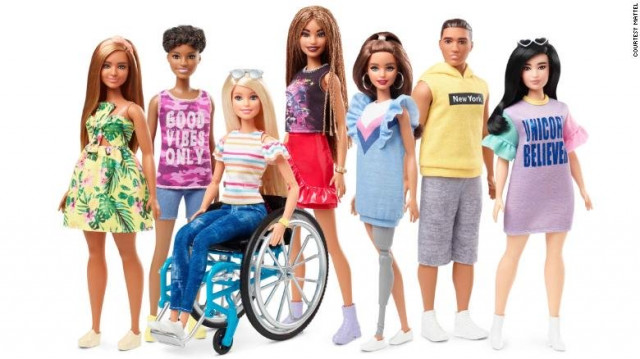Differently-abled Barbie dolls to hit shelves in June
Barbie's new looks could help fight the stigma around physical disabilities

Barbie released this photo of dolls in its new Fashionistas line. PHOTO COURTESY: CNN
The new dolls are part of Mattel's 2019 Barbie new collection of dolls which aims to offer kids more diverse representations of beauty, according to a report on CNN.
"As a brand, we can elevate the conversation around physical disability by including them into our fashion doll line to further showcase a multi-dimensional view of beauty and fashion," Mattel said in a statement.
The company collaborated with Jordan Reeves, a 13-year-old differently-abled activist who was born without a left forearm, to create the doll with the prosthetic limb, which can be removed for a "more realistic" play experience.
The toymaker also worked with UCLA Mattel Children's Hospital and wheelchair experts to design a wheelchair, which the company said has been one of the most requested accessories from Barbie fans.
"While there are many types of wheelchairs, this chair is modelled after one that is designed for an individual who has a permanent physical disability," Mattel said in a statement.
Sindh govt strengthens laws for disabled
It's part of a recent effort by Barbie to incorporate more diversity by offering dolls with different skin shades, eye colours, hairstyles and clothing.
The new dolls are a hit with disability rights activists.
It's symbolic that "a big icon of society like Barbie now demonstrates or shows that there are different types of people ... [who] can be attractive and something kids want to play with," said Curt Decker, executive director of the National Disability Rights Network.
Decker said he hopes the new dolls can remove stigmas surrounding disabilities and show kids that there is "nothing wrong" with people who have them.
According to disability activist Jennifer Laszlo Mizrahi, president of RespectAbility, more than 1 billion people in the world are differently-abled.
"We want to see ourselves reflected in the culture, toys, products and everything around us," Mizrahi said.
This article originally appeared on CNN.



















COMMENTS
Comments are moderated and generally will be posted if they are on-topic and not abusive.
For more information, please see our Comments FAQ